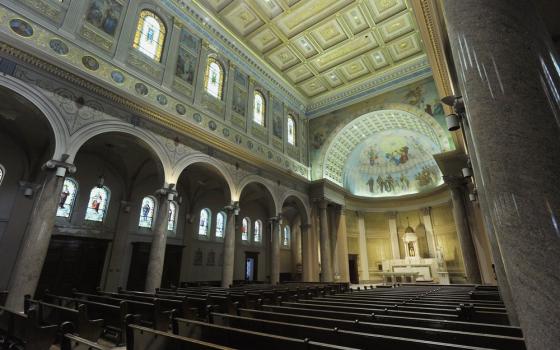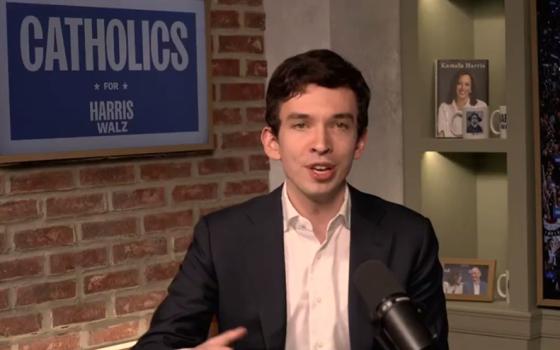A group calling itself "Catholic Whistleblowers" celebrated its launch at a Manhattan news conference May 22.
The group's message:
- Catholics who blow the whistle on the sexual abuse of minors in the church deserve a network they can turn to for support;
- A decade after the church issued "zero tolerance guidelines" for abuse, it is still mishandling these cases;
- The bishops who mishandle these cases must be held accountable.
Founding member Dominican Sr. Sally Butler of Brooklyn, N.Y., said the creation of a nationwide "whistleblower protection program" is necessary. "Clearly, the women and men who work for the church now fear reprisals for speaking out," she said.
Attorney Marci A. Hamilton, the Paul R. Verkuil Chair in Public Law at Cardozo Law School in Manhattan, N.Y., said that she and her team of five law students have promised to defend any whistleblowers who come forward.
Hamilton, a children's rights activist, said she sees the current sexual abuse crisis as a civil rights issue for children. "This boils down to the pursuit of truth," she said.
Eight founding members of the group gathered at Cardozo Law School to read prepared statements and field questions from the media. The group comprises current and former priests, women religious, and laypeople who support survivors of sexual abuse.
Presenters at the news conference included: Butler; Hamilton; Fr. John Bambrick of the Trenton, N.J., diocese; Robert Hoatson, co-founder of Road to Recovery, a group that works with survivors of sexual abuse; Fr. Ken Lasch, a retired priest of the Paterson, N.J., diocese; Fr. Ronald Lemmert, a priest ordained in New York; Notre Dame de Namur Sr. Maureen Turlish; Fr. James Connell of Milwaukee; and Dominican Fr. Thomas Doyle.
In his statement, Bambrick discussed why he is involved in Catholic Whistleblowers. Bambrick was one of two priests to testify before the U.S. bishops in Dallas in 2002, when a zero-tolerance policy on sex abuse was established. At the Dallas meeting, Bambrick said, former St. Paul and Minneapolis Archbishop Harry Flynn, who chaired the bishops' ad hoc committee on sexual abuse by priests, publicly demanded that Bambrick hold the bishops accountable.
"He turned to me and said, 'John, as a priest I want you to hold us to these promises we make to you today; I want you to confront us and hold us accountable.' "
But, according to the group, a decade after the Charter for the Protection of Children and Young People was drafted, bishops who fail to uphold it do not face repercussions from the church.
Referring to bishops who have violated the Dallas Charter, Bambrick said, "I can draw a straight line from west to east. We have witnessed chicanery in Los Angeles, Kansas City [Mo.], Philadelphia, and just this month in Newark, N.J."
Hoatson pointed to the case of Fr. Michael Fugee of the Newark archdiocese, who was not removed from ministry after allegations of child abuse were lodged against him.
"I notified the media in 2009 of the appointment of child abuser Fr. Michael Fugee as hospital chaplain at St. Michael's [Medical Center] in Newark," Hoatson said. "He was ... subsequently appointed to two other leadership positions within Newark archdiocesan headquarters."
Later, though he was supposed to be under supervision, Fugee attended parish youth group events and even overnight trips in the Trenton, N.J., diocese.
Lemmert offered a list of appeals that Catholic Whistleblowers would like met:
- New York Cardinal Timothy Dolan, president of the U.S. Conference of Catholic Bishops, should use his influence to press the Vatican to remove Newark Archbishop John Myers because of his mishandling of the Fugee case.
- All bishops and legislators should remove all statutes of limitations on child sex abuse cases.
- The bishops should create protection policies for all priests, nuns and other church employees who report child sexual abuse or cover-up to civil authorities.
The group recently wrote to Pope Francis with a list of six recommendations. "Most importantly," the group's leaders wrote (emphasis in original), "establish within the Holy See an international body composed of Survivors of Clergy Sexual Abuse, lay professionals and clergy who will be responsible for the facilitation in all dioceses of a dialogue between the Church and victims/survivors of clergy sexual abuse."
The letter also called for any "pledges of secrecy" by church officials to be revoked and for files regarding clergy sex abuse to be made public.
Participants at the event offered a range of ideas for meeting these goals. Certain members said they believe change will come "from the bottom up" if enough lay Catholics pay attention to the problem. Others advocated withholding financial support from dioceses to pressure church leadership.
Lasch said that he believes the Dallas Charter is not only improperly implemented, but also fundamentally flawed. Limiting the charter's "young people" to those below the age of 18 omits an important group of potential victims, he said. The charter is "not applicable in responding to vulnerable adults who have been victims of sexual harassment, attempted rape and rape by Catholic clergy or religious," he said.
For some members of the group, the answer to the sex abuse crisis does not stop with reform of the Dallas Charter or acknowledgment of whistleblowers. Civil law must also be amended.
Turlish said statute of limitations reform is integral in the fight for justice. "No religious denomination … should be depended upon to police itself regarding the sexual abuse of vulnerable populations," she said. "That is society's responsibility."
"I wouldn't trust them [the U.S. bishops] to do what's right, given their track record," she told NCR.
For Butler, changes in civil law need to go beyond statute of limitations reform.
Butler worked in Brooklyn public housing projects for more than 40 years. It was decades after her service began that she learned three priests she worked with had molested countless children, including her foster son. Fed up with the inaction of the Brooklyn diocese regarding these cases, she and other sisters contacted The New York Times in 2002 and told their story.
Butler said she is "particularly concerned about people of color in poor parishes throughout the country who have not been able to report the abuse." She said that people of color "usually cannot trust the church -- a white institution -- or the criminal justice system."
[Ben Feuerherd is a freelance writer based in New York.]



